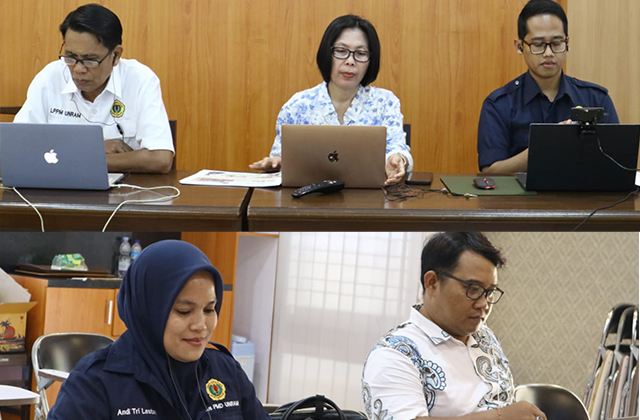Unram Holds Debriefing of KKN 2024: Exploring the Village Potentials

Mataram, University of Mataram – On May 21, 2024, the Service Center for Real Work Study (KKN) and Cooperation of the Research and Community Service Institute of the University of Mataram (LPPM Unram) held KKN debriefing activities for the July-August 2024 period which was carried out online via zoom meeting, which was attended by 180 representatives of KKN groups both on Lombok and Sumbawa islands with the theme “Exploring Village Potential Through KKN to Generate Village Creative Economy, Blue Economy, Green Economy in Improving Village Economy”.
As the object of development and the smallest unit of government, the village’s position at the forefront of service to the community will determine development in the village. The success of village development is also a success for the sub-district, district, provincial and even central government, because village development is an integral part of national development. Village community development is an effort that is carried out in a planned and sustainable manner to achieve the village community that is aspired to in order to achieve a prosperous society (changes in lifestyle and behavior patterns from traditional thinking to modern society).
Unram through the Real Work Study (KKN) Village Community Empowerment (PMD) program sends a total of 1287 students accommodated in 131 groups to plunge into service on the islands of Lombok and Sumbawa. The distribution of the number of PMD KKN students in each district is: 246 students in 25 villages in West Lombok Regency; 197 students in 20 villages in North Lombok Regency; 501 students in 51 villages in East Lombok Regency; 220 students in 22 villages in Central Lombok Regency; 76 students in 8 villages in City of Bima; and 47 students in 5 villages in West Sumbawa Regency.
The distribution of PMD KKN students based on the theme, as follows: 1 Group of Tourism Village Theme; 19 Groups of Blue Economy; 6 Groups of Green Economy; 1 Group of Health Independence; 3 Groups of Advanced & Sustainable Agriculture. While the distribution of DPL KKN PMD are: 25 DPL in West Lombok Regency; 20 DPL in North Lombok Regency; 51 DPL in East Lombok Regency; 22 DPL in Central Lombok Regency; 8 DPL in Bima City; and 5 DPL in West Sumbawa Regency.
Head of LPPM Unram, Prof. Dr. Ir. Sukartono, M.Agr. in his speech said, “This program can be an individual experience for students to enter the community with different problems. This is in line with the function of higher education as an agent of renewal. Therefore, students must be able to act as a bridge (communicator) in the development process and the application of science and technology in particular.”
“KKN PMD is one of Unram’s commitments in the field of community empowerment in the village which is inline with the pillars of productivity, inclusivity and sustainability which are the main values in rural community development,” said Prof. Sukartono.
Community empowerment is basically a process of growth and development of community power to get involved in various aspects of development in a region. With empowerment, it can release people from underdevelopment and poverty, so that people are able to compete with the outside world.
On the same occasion, Prof. Dr. Ir. Siti Hilyana, M.Si. as Vice Rector for Academic Affairs also said, “The role of KKN students and DPL is very important to fill the gap of knowledge of rural communities on the application of creative economy, green economy and blue economy.”
For example in the implementation of the blue economy. There are several challenges that become opportunities for Unram through this KKN PMD program to map out strategic designs, among others: First, the unwise exploitation of marine resources. Therefore, it is necessary to innovate in producing optimal products without damaging the environment. Secondly, the existence of the fishing industry is only carried out at the micro, small and medium enterprise (MSME) level, so the production volume can still be said to be quite low. Lack of knowledge and difficult raw materials are challenges in developing the community’s processed marine products business.
Furthermore, the Professor of Marine Sciences hopes that the welfare of coastal communities through the presence of students and DPL through the KKN PMD program can be increased.
“Improving the welfare of living standards and knowledge of marine product management is expected to have an impact on improving the quality of marine products and have an impact on community development,” she said.
Unram is academically and socially committed to strengthening local entities as the foundation for strengthening the people and country of Indonesia. During the two periods of KKN PMD implementation, it has consistently paid attention to the development of rural communities.
Dr. Ir. Misbahuddin, ST., MT., IPU. as the Head of the Center for Cooperation and KKN emphasized, “This attention is put forward as a standing position as well as an academic and social response to the dynamics of community change and policies on villages. With this position, the role of universities through the KKN PMD program is highly relevant to the context of regional development, renewal of local governance and community empowerment today and in the future.”
